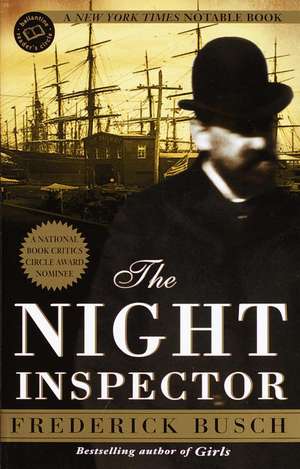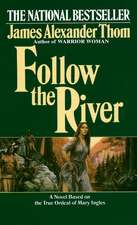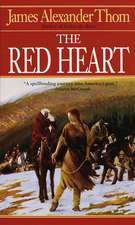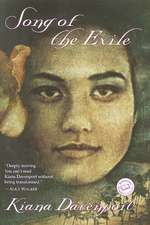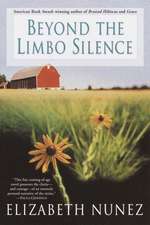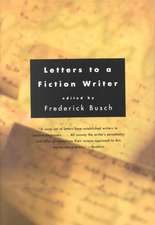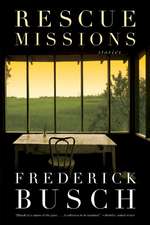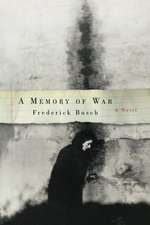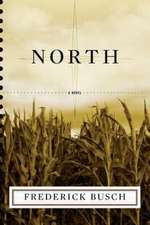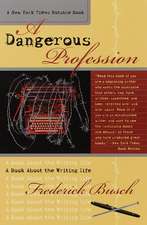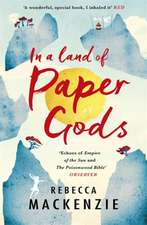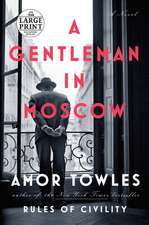The Night Inspector: Ballantine Reader's Circle
Autor Frederick Buschen Limba Engleză Paperback – 30 apr 2000
Vezi toate premiile Carte premiată
National Book Critics Circle Award (1999), PEN/Faulkner Award (2000)
Delving into the depths of this country's heart and soul, Frederick Busch's stunning novel is a gripping portrait of a nation trying to heal from the ravages of war--and of one man's attempt to recapture a taste for life through the surging currents of his own emotions, ambitions, and shattered conscience.
Din seria Ballantine Reader's Circle
-
 Preț: 97.74 lei
Preț: 97.74 lei -
 Preț: 120.15 lei
Preț: 120.15 lei -
 Preț: 107.27 lei
Preț: 107.27 lei -
 Preț: 121.12 lei
Preț: 121.12 lei -
 Preț: 126.98 lei
Preț: 126.98 lei -
 Preț: 113.15 lei
Preț: 113.15 lei -
 Preț: 115.32 lei
Preț: 115.32 lei -
 Preț: 109.66 lei
Preț: 109.66 lei -
 Preț: 102.38 lei
Preț: 102.38 lei -
 Preț: 129.37 lei
Preț: 129.37 lei -
 Preț: 114.71 lei
Preț: 114.71 lei -
 Preț: 65.81 lei
Preț: 65.81 lei -
 Preț: 116.57 lei
Preț: 116.57 lei -
 Preț: 91.96 lei
Preț: 91.96 lei -
 Preț: 90.35 lei
Preț: 90.35 lei -
 Preț: 120.71 lei
Preț: 120.71 lei -
 Preț: 116.64 lei
Preț: 116.64 lei -
 Preț: 139.70 lei
Preț: 139.70 lei -
 Preț: 110.76 lei
Preț: 110.76 lei -
 Preț: 116.55 lei
Preț: 116.55 lei -
 Preț: 112.52 lei
Preț: 112.52 lei -
 Preț: 109.71 lei
Preț: 109.71 lei -
 Preț: 111.51 lei
Preț: 111.51 lei -
 Preț: 111.17 lei
Preț: 111.17 lei -
 Preț: 121.22 lei
Preț: 121.22 lei -
 Preț: 89.48 lei
Preț: 89.48 lei -
 Preț: 106.23 lei
Preț: 106.23 lei -
 Preț: 123.90 lei
Preț: 123.90 lei -
 Preț: 118.73 lei
Preț: 118.73 lei -
 Preț: 126.88 lei
Preț: 126.88 lei -
 Preț: 112.64 lei
Preț: 112.64 lei -
 Preț: 110.96 lei
Preț: 110.96 lei -
 Preț: 128.86 lei
Preț: 128.86 lei -
 Preț: 124.72 lei
Preț: 124.72 lei -
 Preț: 128.86 lei
Preț: 128.86 lei -
 Preț: 122.76 lei
Preț: 122.76 lei -
 Preț: 122.64 lei
Preț: 122.64 lei -
 Preț: 133.06 lei
Preț: 133.06 lei -
 Preț: 132.06 lei
Preț: 132.06 lei -
 Preț: 109.73 lei
Preț: 109.73 lei -
 Preț: 93.82 lei
Preț: 93.82 lei -
 Preț: 101.06 lei
Preț: 101.06 lei -
 Preț: 85.08 lei
Preț: 85.08 lei -
 Preț: 85.13 lei
Preț: 85.13 lei -
 Preț: 79.16 lei
Preț: 79.16 lei -
 Preț: 88.39 lei
Preț: 88.39 lei -
 Preț: 99.83 lei
Preț: 99.83 lei -
 Preț: 92.83 lei
Preț: 92.83 lei -
 Preț: 87.43 lei
Preț: 87.43 lei
Preț: 127.70 lei
Nou
Puncte Express: 192
Preț estimativ în valută:
24.43€ • 25.51$ • 20.18£
24.43€ • 25.51$ • 20.18£
Carte disponibilă
Livrare economică 25 martie-08 aprilie
Preluare comenzi: 021 569.72.76
Specificații
ISBN-13: 9780449006153
ISBN-10: 0449006158
Pagini: 304
Dimensiuni: 132 x 205 x 17 mm
Greutate: 0.25 kg
Editura: BALLANTINE BOOKS
Seria Ballantine Reader's Circle
ISBN-10: 0449006158
Pagini: 304
Dimensiuni: 132 x 205 x 17 mm
Greutate: 0.25 kg
Editura: BALLANTINE BOOKS
Seria Ballantine Reader's Circle
Notă biografică
Frederick Busch's most recent book, Girls, was a New York Times Notable book for 1997. His short story collection, The Children in the Woods, was a finalist for the 1995 PEN/Faulkner Award. He has received the PEN/Malamud Award for achievement in short fiction, the National Jewish Book Award, as well as an award for fiction from the American Academy of Arts and Letters. He has held Woodrow Wilson, National Endowment for the Arts, James Merrill, and Guggenheim fellowships and has been acting director of the Writers' Workshop at the University of Iowa. The Edgar Fairchild Professor of Literature at Colgate University, he teaches creative writing and fiction and also directs the Living Writers program.
From the Hardcover edition.
From the Hardcover edition.
Extras
"No mouth," I told him.
"If I'm to craft a special order for you," he said.
"What is that, a special order?" "Why, this." He held up the sketch. I looked away from it. "The mask, Mr. Bartholomew," he said. "I make arms. I make legs. I've never made a face, sir."
Through the smell of resin and shellac, through the balm of pine shavings, came the odor of his perspiration, and I thought of bivouac, and our stench on the wind. His thick, ragged, graying eyebrows were stippled with sawdust, as was his mustache. One of the knuckles of his broad hand was bloody, and the end of the other hand's long finger had been cut away many years before and had raggedly healed.
"Yes," I said. "Special. I thought at first you meant order of being. Race. A species of man, perhaps. A special order of nature. I cannot abide such speculation. We have collectively demonstrated, and not that many months before, the folly of such thinking."
He smiled at the drawing, but not at me, and he shook his head. "No, sir," he said. "You are enough like the rest of my custom. Only your face is maimed, Mr. Bartholomew. You have your limbs, God forgive us."
"I suggest that I am proof of His unreadiness to do so," I said. We examined his sketch again, and he spoke to me of materials and money. It was to be of pasteboard, he decided, so that my head would not be weighed down. He would build many thin layers, each molded to the one beneath, and would protect them with paint, the better to keep away the deleterious effects of rain and snow. Withal, my head would not be burdened, on account of the lightness of construction. "Like a little craft on the sea," he suggested. I had to smile. He had, it was clear, to look away.
And in the end, he prevailed, and he shaped me a mouth.
I did hear of several who used a buffalo gun, and at first I thought it a lie. How could you haul such a heavy piece of metal and wood up a tree? Not to mention aim with accuracy, or reload with speed? From a hilltop redoubt: yes. With a tripod under the front of that immense, octagonal barrel. But never in a tree, I thought, and of course I was wrong. It was one of my lessons in this long education I received about and from my native country. Never consider a feat undone if the reward is of a size. We move what we must, whether barrels of meat or kegs of dead flesh, when at the farther end of the transaction there lies a crate of dollars. That is how we fare westward, in spite of reversals, anguish, and death.
That is why some very few of us served with the volunteers of New York as what we called marksmen. Snipers, the men of infantry or horse called us, and, behind our backs, assassins. An Englishman I met said thugs. In the woods around Paynes Corners, where I was born, the hamlet lying two hundred miles and more from Manhattan, a small crossroads and then a church and a fur-trading shop for victuals, I learned my forest craftiness. I could hide, and I could seek. I was a solitary child, and powerful of limb. And I was reckless, and born with great vision, though not, alas, of the interior, spiritual sort. But I saw in the dark if there was a hint of a sliver of moon in the sky. How natural, then, with my youth and young manhood passed in patrolling a trapline and hunting for my meals, that I would make a marksman when called to the War.
It was a Sharps that I carried into the trees. I wore a pannier of sixty rounds, and always a pistol in a holster at my back. The knife I wore at my left side, and I drew with my right. It was good for game, and bad for men, I once told the sergeant who saw me out and up and hunting Rebels.
"Kindly do not boast of the assassinations, Mr. Bartholomew. You fire your weapon, but in this chain of command, you are my weapon. And I think we owe it to the dead to never boast about our work."
"It is the brigadier's wish and your command that I take to the trees and shoot men down."
"Truly said, Mr. Bartholomew. I wonder if I rebuke myself while addressing you." He looked away as he spoke, though I was whole of face, and had smooth enough skin, and all of my nose and lips and jaw. I watched a fly hover at his ear. I thought to seize it, and I could have. He turned, and he read my expression, I suppose, and drew back a pace. "This triumph of ours," he said, "our killing them off, is no pleasure to me. Those are men like us."
"No, Sergeant," I said, "with all respect. They are dead, and we are not, and that's the nature of our transaction."
Smoke from the cooks' wagons blew in on us. He tried not to smile, I think. He said, "As you were, Mr. Bartholomew."
I drew myself taut. He said, "I hope you return safe and well."
"Sergeant."
"And I wonder how you sleep, bless you."
"Fitfully," I said.
He nodded. He caressed his ginger beard, which did not give him the appearance of age I believe he sought. He covered his lips an instant with his fingers, and I saw his fatigue, and his fear, of course. He was from a village up on the Hudson and had been raised in wealth. He was a powerful leader in battle, and in sum a man of strength. Many months later, when the hunters took me down, I tried to ask him to kill me, but I could not work my jaw. He only wrapped my head in what I later learned was his shirt, and he carried me across his saddle, propped against his breast, to a Southern farrier, who thought to cauterize some of the area of wound.
When I had stopped screaming, I heard the sergeant tell the farrier, "You enjoyed that." I heard him cock his piece, and I waited for him to fire. Someone, I remember thinking, should be shot. Then I remembered that I had already filled the bill.
"If I'm to craft a special order for you," he said.
"What is that, a special order?" "Why, this." He held up the sketch. I looked away from it. "The mask, Mr. Bartholomew," he said. "I make arms. I make legs. I've never made a face, sir."
Through the smell of resin and shellac, through the balm of pine shavings, came the odor of his perspiration, and I thought of bivouac, and our stench on the wind. His thick, ragged, graying eyebrows were stippled with sawdust, as was his mustache. One of the knuckles of his broad hand was bloody, and the end of the other hand's long finger had been cut away many years before and had raggedly healed.
"Yes," I said. "Special. I thought at first you meant order of being. Race. A species of man, perhaps. A special order of nature. I cannot abide such speculation. We have collectively demonstrated, and not that many months before, the folly of such thinking."
He smiled at the drawing, but not at me, and he shook his head. "No, sir," he said. "You are enough like the rest of my custom. Only your face is maimed, Mr. Bartholomew. You have your limbs, God forgive us."
"I suggest that I am proof of His unreadiness to do so," I said. We examined his sketch again, and he spoke to me of materials and money. It was to be of pasteboard, he decided, so that my head would not be weighed down. He would build many thin layers, each molded to the one beneath, and would protect them with paint, the better to keep away the deleterious effects of rain and snow. Withal, my head would not be burdened, on account of the lightness of construction. "Like a little craft on the sea," he suggested. I had to smile. He had, it was clear, to look away.
And in the end, he prevailed, and he shaped me a mouth.
I did hear of several who used a buffalo gun, and at first I thought it a lie. How could you haul such a heavy piece of metal and wood up a tree? Not to mention aim with accuracy, or reload with speed? From a hilltop redoubt: yes. With a tripod under the front of that immense, octagonal barrel. But never in a tree, I thought, and of course I was wrong. It was one of my lessons in this long education I received about and from my native country. Never consider a feat undone if the reward is of a size. We move what we must, whether barrels of meat or kegs of dead flesh, when at the farther end of the transaction there lies a crate of dollars. That is how we fare westward, in spite of reversals, anguish, and death.
That is why some very few of us served with the volunteers of New York as what we called marksmen. Snipers, the men of infantry or horse called us, and, behind our backs, assassins. An Englishman I met said thugs. In the woods around Paynes Corners, where I was born, the hamlet lying two hundred miles and more from Manhattan, a small crossroads and then a church and a fur-trading shop for victuals, I learned my forest craftiness. I could hide, and I could seek. I was a solitary child, and powerful of limb. And I was reckless, and born with great vision, though not, alas, of the interior, spiritual sort. But I saw in the dark if there was a hint of a sliver of moon in the sky. How natural, then, with my youth and young manhood passed in patrolling a trapline and hunting for my meals, that I would make a marksman when called to the War.
It was a Sharps that I carried into the trees. I wore a pannier of sixty rounds, and always a pistol in a holster at my back. The knife I wore at my left side, and I drew with my right. It was good for game, and bad for men, I once told the sergeant who saw me out and up and hunting Rebels.
"Kindly do not boast of the assassinations, Mr. Bartholomew. You fire your weapon, but in this chain of command, you are my weapon. And I think we owe it to the dead to never boast about our work."
"It is the brigadier's wish and your command that I take to the trees and shoot men down."
"Truly said, Mr. Bartholomew. I wonder if I rebuke myself while addressing you." He looked away as he spoke, though I was whole of face, and had smooth enough skin, and all of my nose and lips and jaw. I watched a fly hover at his ear. I thought to seize it, and I could have. He turned, and he read my expression, I suppose, and drew back a pace. "This triumph of ours," he said, "our killing them off, is no pleasure to me. Those are men like us."
"No, Sergeant," I said, "with all respect. They are dead, and we are not, and that's the nature of our transaction."
Smoke from the cooks' wagons blew in on us. He tried not to smile, I think. He said, "As you were, Mr. Bartholomew."
I drew myself taut. He said, "I hope you return safe and well."
"Sergeant."
"And I wonder how you sleep, bless you."
"Fitfully," I said.
He nodded. He caressed his ginger beard, which did not give him the appearance of age I believe he sought. He covered his lips an instant with his fingers, and I saw his fatigue, and his fear, of course. He was from a village up on the Hudson and had been raised in wealth. He was a powerful leader in battle, and in sum a man of strength. Many months later, when the hunters took me down, I tried to ask him to kill me, but I could not work my jaw. He only wrapped my head in what I later learned was his shirt, and he carried me across his saddle, propped against his breast, to a Southern farrier, who thought to cauterize some of the area of wound.
When I had stopped screaming, I heard the sergeant tell the farrier, "You enjoyed that." I heard him cock his piece, and I waited for him to fire. Someone, I remember thinking, should be shot. Then I remembered that I had already filled the bill.
Recenzii
"Compelling . . . A marvelously dark-hued story by a master craftsman."
--The New York Times Book Review
"A SUBLIMELY DARK WORK OF ALMOST UNBEARABLE BEAUTY. An exploration of evil, hidden identities and the dehumanizing forces of commerce, The Night Inspector has a moral heft and stylistic grace not unlike the work of [Herman Melville]."
--The Wall Street Journal
"A STYLISTIC GEM OF A BOOK, FLAWLESSLY PLOTTED AND PHILOSOPHICALLY RICH . . . Busch has followed his remarkable novel, Girls, not with a merely effective novel, but an essential one. . . . Stunning."
--Boston Globe
"THIS HAUNTING AND INTENSE NARRATIVE'S WRITING EXPLODES ON EACH PAGE WITH PRECISE FEROCITY."
--Dallas Morning News
--The New York Times Book Review
"A SUBLIMELY DARK WORK OF ALMOST UNBEARABLE BEAUTY. An exploration of evil, hidden identities and the dehumanizing forces of commerce, The Night Inspector has a moral heft and stylistic grace not unlike the work of [Herman Melville]."
--The Wall Street Journal
"A STYLISTIC GEM OF A BOOK, FLAWLESSLY PLOTTED AND PHILOSOPHICALLY RICH . . . Busch has followed his remarkable novel, Girls, not with a merely effective novel, but an essential one. . . . Stunning."
--Boston Globe
"THIS HAUNTING AND INTENSE NARRATIVE'S WRITING EXPLODES ON EACH PAGE WITH PRECISE FEROCITY."
--Dallas Morning News
Textul de pe ultima copertă
An immensely powerful story, The Night Inspector follows the extraordinary life of William Bartholomew, a maimed veteran of the Civil War, as he returns from the battlefields to New York City, bent on reversing his fortunes. It is there he meets Jessie, a Creole prostitute who engages him in a venture that has its origins in the complexities and despair of the conflict he has left behind. He also befriends a deputy inspector of Customs named Herman Melville who, largely forgotten as a writer, is condemned to live in the wake of his vanished literary success and in the turmoil of his fractured family.
Delving into the depths of this country's heart and soul, Frederick Busch's stunning novel is a gripping portrait of a nation trying to heal from the ravages of war -- and of one man's attempt to recapture a taste for life through the surging currents of his own emotions, ambitions, and shattered conscience.
Descriere
William Bartholomew, a maimed veteran of the Civil War, returns to New York City bent on reversing his fortunes. Busch's stunning novel is a gripping portrait of a nation trying to heal from the ravages of war and of one man's attempt to recapture a taste for life through the surging currents of his own emotions, ambitions, and shattered conscience.
Premii
- National Book Critics Circle Award Nominee, 1999
- PEN/Faulkner Award Nominee, 2000
